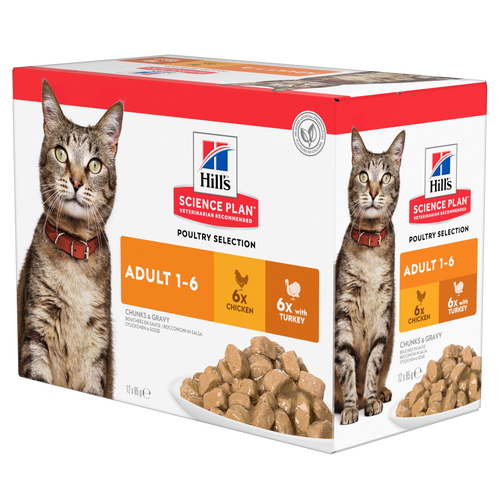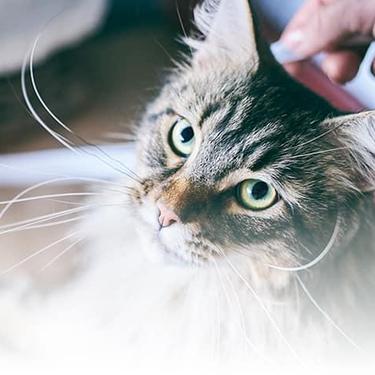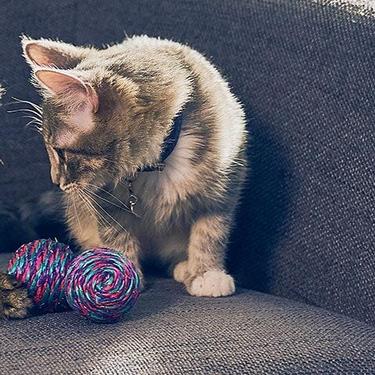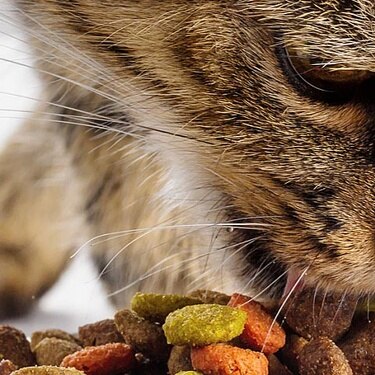
-
Find the right food for your petTake this quiz to see which food may be the best for your furry friend.Find the right food for your petTake this quiz to see which food may be the best for your furry friend.Featured products
 Puppy Food
Puppy FoodHill's Science Plan Puppy Multipack Wet Dog Food with Chicken & Beef are complete premium pet foods for growing puppies from weaning until 1 year old and for pregnant and nursing dogs. Your puppy will love these deliciously smooth and savoury minced loaves, formulated for balanced nutrition and overall health.
Shop Now Adult Wet Dog Food with Beef
Adult Wet Dog Food with BeefHill's Science Plan Adult Multipack Wet Dog Food with Chicken, Beef & Turkey are complete premium pet foods for adult dogs from 1 year. Your dog will love these deliciously smooth and savoury minced loaves, formulated for balanced nutrition and overall health.
Shop Now Mature Adult Dog Food
Mature Adult Dog FoodHill's Science Plan Mature Adult Multipack Wet Dog Food with Chicken & Beef are complete premium pet foods for mature adult dogs from 7 years. Your dog will love these deliciously smooth and savoury minced loaves, formulated to deliver the appropriate amount of energy to support the needs of adult dogs.
Shop NowFeatured products Light Adult Multipack Wet Cat Food with Chicken & Ocean Fish
Light Adult Multipack Wet Cat Food with Chicken & Ocean FishTender chicken chunks in gravy for cats, with L-carnitine and fewer calories for ideal weight management. Packed with high-quality protein, omega-6s, and vitamin E for shiny fur and healthy skin.
Shop Now Adult Multipack Wet Cat Food with Beef, Ocean Fish & Chicken
Adult Multipack Wet Cat Food with Beef, Ocean Fish & ChickenTender chunks in gravy for cats, with high-quality protein to maintain lean muscle. With vitamin E and omega-3s & -6s for healthy skin and balanced minerals to support healthy vital organs.
Shop Now Mature Adult Wet Cat Food with Chicken
Mature Adult Wet Cat Food with Chicken
Tender chicken chunks in gravy for mature adult cats. Made with easy-to-digest ingredients, high-quality protein for lean muscle maintenance and antioxidant vitamins C+E for optimal health.
Shop Now -
Dog
- Dog Tips & Articles
-
Health Category
- Weight
- Food & Environmental Sensitivities
- Urinary
- Digestive
- Joint
- Kidney
-
Life Stage
- Puppy Nutrition
- Adult Nutrition
- Senior Nutrition
Cat- Cat Tips & Articles
-
Health Category
- Weight
- Skin & Food Sensitivities
- Urinary
- Digestive
- Kidney
-
Life Stage
- Kitten Nutrition
- Adult Nutrition
Featured articles The Incredible Science Behind Your Pet's Microbiome
The Incredible Science Behind Your Pet's MicrobiomeLearn what your pet's microbiome is, how it contributes to your pet's gut and overall health, and why nutrition is important in maintaining healthy microbiomes.
Read More Show some love with wet foods: a great choice for pets with health issues
Show some love with wet foods: a great choice for pets with health issuesShow some love with wet foods: a great choice for pets with health issues.
Read More The Right Diet For Your Pet
The Right Diet For Your PetIn people, the right diet is very important. If you are eating the wrong way for your metabolism, activity level, age and lifestyle you could end up with health issues.
Read More -


Digestive upsets are never pleasant for your cat or you, and they can be some of the most worrying times. From vomiting to soft poo to full blown diarrhoea, there is a whole array of things that can go wrong with the gastrointestinal tract. In this article, we’ll look at how you can best support your cat’s digestion to keep it in tip-top health and hopefully avoid those upsets in the first place.
How are cats different when it comes to diet and digestion?
It’s thought that cats have evolved from the African wild cat, originally living in arid places. They lead largely solitary lives, apart from when they come together to find a mate. Compared to some animals, cats have relatively simple digestive tracts and have evolved to eat small, frequent, meaty meals. Cats in the wild spend lots of time hunting and usually eat 10-20 small meals a day. They are what’s called obligate carnivores, which means they have to have meat in their diet; they can’t produce certain essential nutrients themselves, like some amino acids, which are only found in meat.


Tasty Tips
Supporting your cat’s digestion: what to feed, how to feed and how to avoid stress
What to feed your cat
Fundamentally, your cat needs cat food! This may sound silly, but because they are obligate carnivores, you may not meet all their nutritional needs if you feed them something like dog food. Always feed your cat a complete and balanced cat food that is suitable for its life stage. This means kitten food for kittens, adult food for adult cats, and senior food for seniors. If your cat has been neutered or tends to lounge around inside, you may need to feed them a lower-calorie food than you would a more active, outdoor cat.
Ask your vet if your cat is an ideal weight and always feed for the weight your cat should be. If they are overweight or underweight, that will be different from their current weight.
If your cat has never had any digestive upsets, then a good-quality, complete and balanced cat food should be fine. If your cat is prone to digestive upsets, though, your vet may recommend a very highly digestible food or a therapeutic diet for your cat’s individual issues.
Always try to feed cats a mixture of wet and dry food if you can. Cats get very hooked on textures, so if you feed them a variety from the word go, if ever you have to feed a certain type of food, your cat is much more likely to accept the change. Wet food is also great for ensuring good water intake, too.
The best way to feed your cat
Cats have simple, quite short digestive tracts, so they are best suited to small, frequent meals, as opposed to one or two large ones. Feeding several small meals a day keeps your cat interested and feeling fuller throughout the day, and can help with digestion because their digestive tract has evolved this way. Ideally aim to feed 4-6 meals a day.
If you’re out and about in the day, timer feeders can be really useful for splitting meals. Also, as cats tend to be active throughout the day and night, you can even programme them to give a meal in the night, rather than you being woken up by a peckish feline friend!
Avoiding stress for your cat
Cats are subtle, sensitive creatures and can be easily stressed by a number of things: living with other cats, either in the same house or in the neighbouring area; being kept indoors; having visitors; having a baby or small child in the home; or their owner going on holiday. Stress is one of the biggest avoidable causes of digestive upsets in our cat companions. If you feel this might be an issue, there are lots of simple changes you can make in the home environment to alleviate stress.
Can protein be too high for your cat?
Because cats are obligate carnivores, some people say they should have very high protein levels in their diets. While cats do need a higher protein level than dogs, too much has been shown to have a negative effect on their microbiome and may be harmful to gut health in the longer term.
If you ever have any worries or concerns, have a chat with your vet or vet nurse about what you might be able to do to keep your cat’s mind and body – and therefore their digestive tract – happy!
Reviewed by Dr. Hein Meyer, DVM, PhD, Dipl-ECVIM-CA


One of our staff authors prepared this article for you
Related products

Tender chicken chunks in gravy for cats, with L-carnitine and fewer calories for ideal weight management. Packed with high-quality protein, omega-6s, and vitamin E for shiny fur and healthy skin.


Tender chicken chunks in gravy for mature adult cats. Made with easy-to-digest ingredients, high-quality protein for lean muscle maintenance and antioxidant vitamins C+E for optimal health.

Tender chunks in gravy for cats, with high-quality protein to maintain lean muscle. With vitamin E and omega-3s & -6s for healthy skin and balanced minerals to support healthy vital organs.
Related articles

Learn how to make homemade cat treats that are healthy for your pet with this recipe from Hills Pet Nutrition.

Kittens grow a lot in their first year, so it is important to provide them with the proper nutrients early, so they grow up healthy and strong. Learn more.

There are three common ways to feed a cat. Each way has its advantages and disadvantages.

From essential vitamins & minerals to different types of meat, learn what to look for when choosing the best cat food for your feline.

Put your cat on a diet without them knowing
Our low calorie formula helps you control your cat's weight. It's packed with high-quality protein for building lean muscles, and made with purposeful ingredients for a flavourful, nutritious meal. Clinically proven antioxidants, Vitamin C+E, help promote a healthy immune system.
Put your cat on a diet without them knowing
Our low calorie formula helps you control your cat's weight. It's packed with high-quality protein for building lean muscles, and made with purposeful ingredients for a flavourful, nutritious meal. Clinically proven antioxidants, Vitamin C+E, help promote a healthy immune system.

